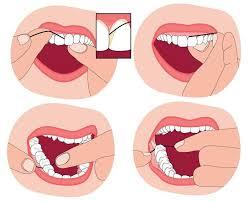
You may have been told by your dentist or Oral Health Therapist to floss more and there is a very good reason for this. Flossing is an essential part of oral hygiene that many people overlook. While brushing your teeth twice a day is crucial, it’s not enough to remove all the plaque and very small food particles that can get stuck between your teeth.
Flossing daily will help to:
- Prevent Tooth Decay: Plaque build-up between teeth can lead to cavities.
- Reduce Gum Disease Risk: Gum disease starts with gingivitis, regular flossing helps keep gums healthy by removing bacteria.
- Freshen Breath: Food particles trapped between teeth can cause bad breath. Flossing removes these particles, promoting fresher breath.
- Enhance Overall Health: Good oral hygiene, including flossing, is linked to lower risks of systemic health issues like heart disease and diabetes.
How to Floss Properly
Break off about 30 centimetres of floss and wrap most of it around your middle or index fingers, whichever feels most comfortable, leaving  5cm in the middle to work with.
5cm in the middle to work with.
Gently slide the floss between each tooth using a sawing motion (don’t forget behind the last tooth as well).
Curve the tooth against each tooth in a ‘C’ shape, sliding it up and down against the tooth surface including gently below the gum line. Do this motion on both teeth when flossing between two teeth.
Aim to floss at least once a day, preferably before brushing your teeth at night.
Common Flossing Mistakes
- Not Flossing Enough: Skipping flossing can lead to plaque build-up and gum issues.
- Flossing Too Roughly: Be gentle to avoid hurting your gums.
- Using Too Little Floss: Not using enough floss can make it difficult to clean effectively.
Alternatives to Traditional Floss
For those who find traditional floss challenging, there are alternatives:
- Floss Picks: Convenient and easy to use, these can be carried in your bag.
- Water Flossers: These devices use a stream of pulsating water to remove debris and can be particularly effective for those with braces or implants.
- Interdental Brushes: These small brushes can clean between teeth, especially in wider gaps.
Flossing is a vital habit for maintaining optimal oral health. By incorporating it into your daily routine, you can enjoy a brighter smile and a healthier mouth. Don’t forget to visit your dentist and Oral Health Therapist regularly for professional hygiene treatment and check-ups :)

